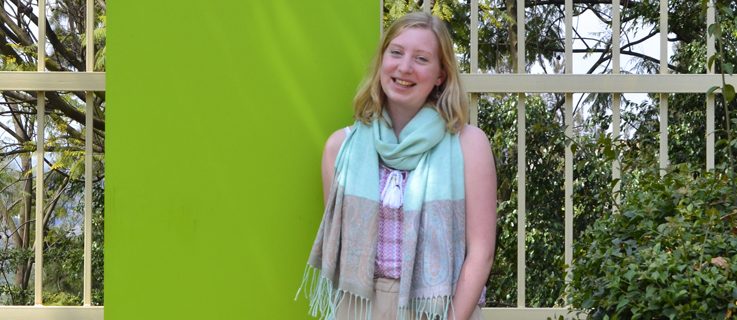Our colleague Franziska Schenk from the HQ of Goethe-Institut in Munich, music department, was in Kigali to follow the Freak de l'afrique tour, a workshop for DJ’s held by Freak de l’Afrique and getting to know the music scene in Rwanda.
What is your area of responsibility at the Goethe Institute in Munich?
The Music Department at the Munich headquarters acts as an advisor and source of inspiration for the Goethe Institutes abroad and the German embassies. The programmes are the result of the interaction between the Goethe Institutes abroad and local partners such as festivals, concert halls or clubs - supported by expertise and in dialogue with the department. The aim is to communicate the diverse music scene in Germany and to enable an intensive exchange of musicians from Germany and abroad.
We present current trends in the German music scene in two monthly podcasts - the popcast and the classiccast - I look after the former, which we produce in cooperation with Zündfunk. In addition, it is my job to advise musicians on our funding formats and to organise internal training courses in the field of music. My field of activity is rounded off by the planning of tours in sub-Saharan Africa, which I organise in cooperation with the local institutes that commission them.
You spend a lot of time professionally with music. How do you keep up to date with new developments?
I use different channels to keep up with the latest developments and musicians. On the one hand, this includes daily reading of the feature pages of the major daily newspapers (Süddeutsche Zeitung, FAZ). Then there is a wide range of specialist journals in the various music genres. For the pop sector, for example, Missy Magazine or Groove are the best. On the other hand I listen to podcasts or certain radio broadcasts, like Sweet Spot or Zündfunk. And of course you shouldn't miss a concert or two - Munich has a diverse cultural program from which you can draw.
You spent several weeks as an intern at a Goethe Institute abroad. What is the interesting thing about an internship and why did you choose East Africa?
In contrast to the colleagues in the rotation, the staff inside the head office usually remain in Munich. In my work, I am in daily contact & in exchange with my colleagues abroad and get an insight into the most diverse cultural scenes, but do not experience the programmes and measures carried out on site. Working as an intern at a Goethe-Institut abroad makes this possible: getting to know local structures, partners and scenes and the associated challenges and opportunities. It was an immense enrichment to gain an insight into the daily work of the institute, to exchange ideas with colleagues and to experience the effect of cultural and language course programmes up close. Thanks to the whole team of the Goethe-Institut Kigali!
You go back to your work in the head office with a different & sharper view and have a better understanding of certain processes and working methods abroad.
Rwanda has been very appealing to me because of its reputation as a pioneer in the field of environment, security and anti-corruption on the African continent. Kigali is also seen as an engine for start-ups and the cultural and creative industries. These current developments, coupled with the historical links between colonialism and genocide, have aroused a great deal of interest in me and, among other things, have led me to choose the Goethe-Institut Kigali. In addition, the Goethe-Institut in Kigali is - in comparison worldwide - a smaller institute and I was interested in how to act with a lower personnel and financial strength.
How did the Tour Life of Freak de l'Afrique affect you?
Freak de l'Afrique impressed me very much with her commitment and her positive vibes. Kigali was already the fourth and penultimate station of the East Africa tour and Freak de l'Afrique was full of energy and went enthusiastically into exchange with local DJs in the workshop. Those who expected Sex, Drugs & Rock'n Roll were disappointed, but were rewarded with something more beautiful - a trio that got involved with the people and the local scene and made the cosmos of African beats shine.
How did you get to know the music scene in Rwanda?
Which discoveries impressed you most here?
The team of the Goethe-Institut Kigali introduced me to many different actors of the music scene. The workshop and the concert by Freak de l'Afrique in the Mamba were the prelude. At the workshop some DJ's gathered and I could get first insights into the local DJ scene.
The regional project "Urban Music Rebel" explores the interplay of contemporary/electronic and traditional sounds and brings together musicians from Rwanda, Uganda and Tanzania in workshops at the Ongala Music Festival in August in Tanzania. I was able to get to know the musicians representing Rwanda: Eric Soul, known as AFROGROOV, and Angell Mutoni will present the contemporary music, Deo Munyakazi as Inanga player will contribute the traditional component.
In addition, I was able to talk to Angell Mutoni and Mucyo about the role of women in the music business in Rwanda.
I was particularly impressed by the Rwanda School for Arts and Music in the Muhanga district, which is the only music school in the country to train professional musicians. The young men and women gave us a spontaneous private concert and played some traditional pieces for Inanga and singing - that was a great moment! You can feel that the students are burning for music and I hope that the school will receive further support to invest in music education and the future of the young generation.
